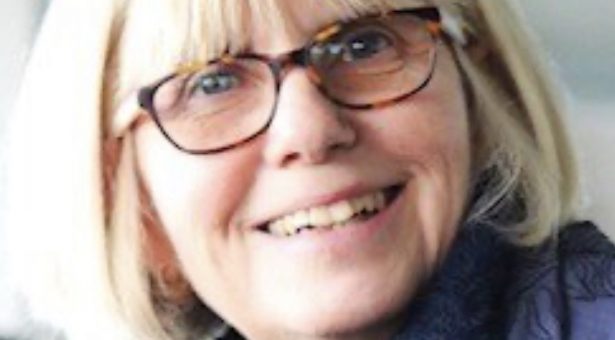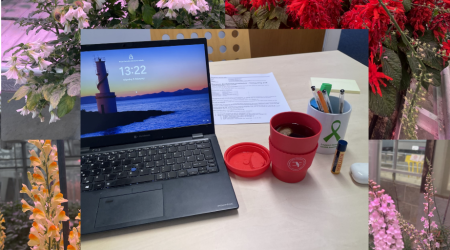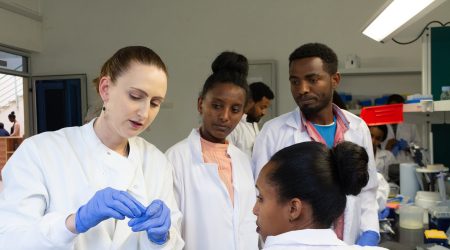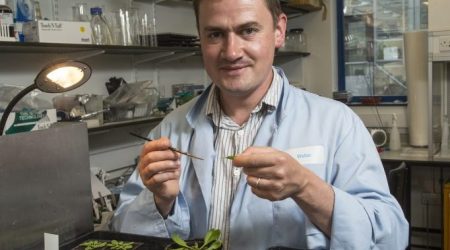Meet Lesley Mitchenall, Research Assistant

Earlier this year we met with Lesley Mitchenall, a Research Assistant in Tony Maxwell’s lab to find out more about her long and varied science career at the John Innes Centre.
Lesley won the Lifetime Achievement Award at the inaugural Research Institute Technician Awards in 2021 and also won the John Innes Centre Mentor Champion award in 2022.
Over her career at the John Innes Centre, she has mentored 27 postdocs, 24 PhD students, 6 temporary research assistants, 4 year-in-industry students, and more than 25 BSc/MSc project students and visitors.
“I left my village comprehensive school in 1978 with two A levels and a handful of O levels. At school, I was torn between the sciences and the humanities, but you had to choose, and science won. Looking back it didn’t quite sit right that I had to drop some of the things I was good at, so I ended up persuading my school to let me do Biology and Economics as long as I did Chemistry in my lunch hour.
“I grew up on Salisbury Plain, and the biggest nearby scientific employer was Porton Down, which was run by the MoD. In the late 70s, I worked there for almost a year on a really early mass spectrometry machine which was basically a myriad of small-bore tubes, and a detector that produced a paper readout at the end.
“The team there were looking at the role of L-asparagine in cancer, and I would run the blood samples. Once I finished that job, I spent a couple of years working other jobs in and out of science, before trying to start a degree at Oxford Brookes, which was then known as Oxford Poly.
“My ambitions to study biology and anthropology were short-lived too as I couldn’t get funding for the first year. I had flunked again! But after moving to Brighton for 2 years, I was determined not to give up. In 1984, I started as an Assistant Scientific Officer at the Unit of Nitrogen Fixation at Sussex University, where they encouraged me to do a Higher National Diploma.
“In 1995, as the Nitrogen Fixation Laboratory, we moved wholesale into our bespoke, brand new Chatt building here in Norwich. Our merger with the John Innes Institute and the Cambridge Laboratory gave birth to the John Innes Centre. Next year I’ll have been doing this job for 40 years!”
Lesley works in the Maxwell group, which studies topoisomerases in order to develop new drugs, like antibiotics or anti-cancer drugs. We asked Lesley about her research, and her role in this area.
“I love making active enzymes. The family of proteins that our group mainly work on (topoisomerases) are fascinating tiny machines. They are mechanical winders and unwinders of DNA and are crucial for life.
“Although we are a group that mainly works on microbial enzymes, we have had projects on a couple of plant enzymes that belong to the wider topoisomerase family. Being on this site then proved invaluable and we collaborated with a number of local groups including those who work on peas and those who use Arabidopsis as their model plant. We have also had collaborations with the Lomonossoff group using their transient expression system and we have worked closely with the insectary which is an amazing resource.”
Lesley works as a research assistant, which means she provides a source of experience and guidance to the research group, helping other lab members design and carry out experiments, as well as working her own research projects.
“I like to think I play a large part in helping to develop future scientists. In our lab, I do a lot of the day-to-day training of people, including undergraduates who might not have spent any time in a lab before.
“This can impact my own lab work as I spend most of my time mentoring people and helping them move on to the next stage in their career – so although I don’t have so many first author papers, but the fact that I work on many different projects means I’ve ended up being an author on a respectable number of articles nonetheless.
“Over the years we have had many collaborations, from all over the world and from nearly every continent. The USA, Canada and South America, China, many European countries as part of EU consortiums, Australia, India, Russia, the list goes on.
“I’ve come to appreciate the diversity of people I meet in the course of my job, and this has very much influenced the way I see myself and the world. Being able to work with people from lots of different backgrounds and ages has really broadened my outlook. I feel so lucky that I have been able to be in this position for so long.”



